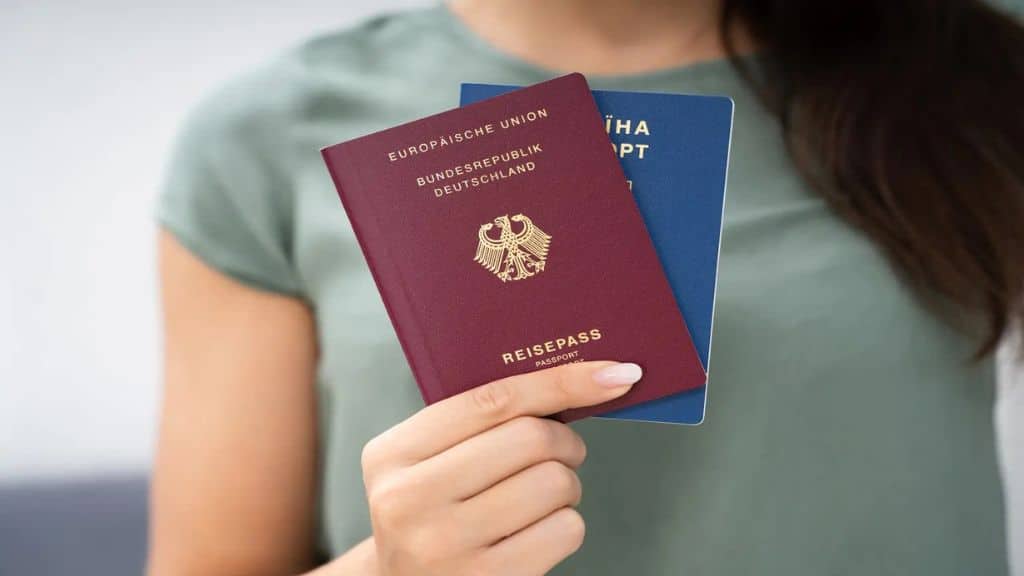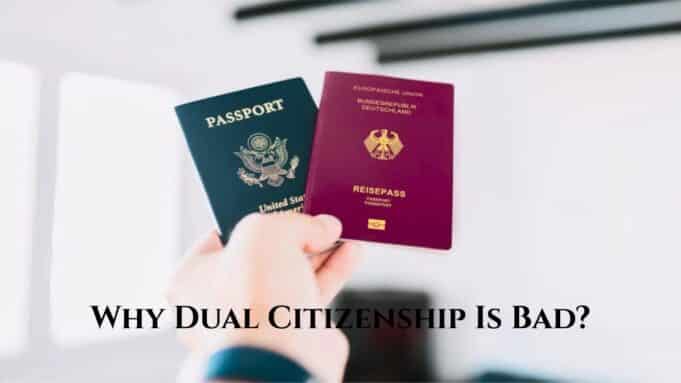Dual citizenship, also known as dual nationality, refers to holding legal citizenship in two countries at the same time. For many, it sounds like an attractive opportunity, allowing global mobility, expanded business options, educational access, and a sense of belonging in more than one nation.
However, those wondering why dual citizenship is bad should consider the hidden drawbacks. What initially appears as a privilege can quickly become a source of legal, financial, and personal complications. Despite its appeal, dual citizenship often comes with challenges that outweigh its benefits, creating difficulties that affect nearly every aspect of life.
What Is Dual Citizenship?
Dual citizenship, also called dual nationality, is the legal status of being a recognized citizen of two different countries at the same time. This means an individual enjoys the rights, privileges, and responsibilities of both nations, such as voting, working, owning property, and accessing social services. However, it also comes with obligations like paying taxes or fulfilling civic duties in both countries. While it may seem like an advantage, dual citizenship often creates legal, financial, and personal challenges that can complicate daily life and long-term planning.
Legal and Political Complications
One of the most significant drawbacks of dual citizenship is navigating conflicting laws between two countries. A person may be legally required to follow contradictory rules, leading to confusion or legal jeopardy. Another major issue is double taxation—many countries tax their citizens on worldwide income, meaning an individual could be taxed twice on the same earnings. In addition, dual citizens may face mandatory obligations, such as compulsory military service or jury duty, in both nations. Beyond legal responsibilities, political loyalty becomes a concern. Governments and employers may question a dual citizen’s allegiance, particularly in sensitive positions involving national security or policymaking. This divided loyalty can lead to limited career opportunities and strained trust.
Read More: Naturalized vs. Derived Citizens
Financial and Tax Burdens
From a financial perspective, dual citizenship can be more of a liability than a benefit. Double taxation is a recurring problem, forcing individuals to navigate complicated tax treaties and reporting requirements. Filing taxes in multiple jurisdictions is not only stressful but also costly, often requiring specialized accountants to remain compliant. There are also hidden expenses associated with maintaining dual nationality, such as passport renewals, processing fees, and penalties for non-compliance with regulations. Furthermore, many countries impose taxes on worldwide income, which means that investments, properties, or business profits abroad could be subject to heavy taxation. These financial burdens often turn what was once perceived as an opportunity into an ongoing struggle with paperwork and expenses.
National Loyalty and Allegiance Issues
Divided Allegiance
A fundamental concern surrounding dual citizenship is the issue of divided allegiance. Citizenship inherently implies a bond of loyalty between an individual and their country, encompassing respect for its laws, support for its values, and a willingness to defend its interests. However, when a person holds citizenship in two nations—particularly those with competing political, cultural, or economic agendas—it becomes difficult to determine where their true loyalty lies.
This ambiguity is especially problematic for individuals serving in sensitive positions such as government officials, diplomats, military personnel, or intelligence agents. In these roles, even the perception of dual allegiance can compromise public trust, undermine institutional integrity, and pose a national security risk. Questions may arise about which country the individual would prioritize in a conflict or where their personal and ideological loyalties ultimately rest.
Undermining National Unity
Beyond individual cases, widespread dual citizenship can dilute a country’s sense of collective identity and national cohesion. When citizens maintain strong ties to another nation—through language, culture, or legal obligations—they may feel less inclined to embrace and promote the values, traditions, and goals of the country in which they reside. This divided sense of belonging can hinder social integration and weaken the civic fabric of communities, leading to fragmented societies with competing allegiances.
In times of political or social crisis, such divisions can escalate tensions, as dual citizens may be perceived as outsiders or as having conflicting interests. This undermines the unity needed to address national challenges collectively and effectively.
Security and Travel Restrictions

Dual citizenship can complicate international travel in ways that many people overlook. Holding passports from two countries may create issues when visiting nations that are politically hostile to one of them. For example, a citizen of both Country A and Country B may face suspicion, denial of entry, or stricter screening in countries unfriendly to either. In times of political conflict or war, a dual citizen may also experience limited consular protection, as each country could refuse responsibility, leaving the individual vulnerable. In some cases, nationality conflicts can even result in detention or travel bans, particularly if local authorities view the person as a potential security risk. What seems like freedom of movement can instead lead to restricted mobility and heightened risk while abroad.
Know More: Caribbean Citizenship: Investing in Tropical Idylls and Global Opportunities
Career and Employment Challenges
Professional opportunities can also be limited for dual citizens. Many governments place restrictions on individuals with multiple nationalities when it comes to employment in sensitive or high-security positions, such as intelligence, defense, or diplomatic services. This is largely due to concerns about security clearance and the possibility of divided loyalties. Even in the private sector, business leaders or executives holding dual nationality may face skepticism, with employers questioning their commitment or national allegiance. In industries that value trust and confidentiality, this perception of divided loyalty can hinder advancement and professional growth, creating barriers where single citizens would encounter none.
Family and Inheritance Issues
Dual citizenship also brings complexity into family and inheritance matters. When relatives live across different jurisdictions, inheritance laws may conflict, creating disputes or difficulties in transferring property, assets, or estates. Custody issues can also arise, as dual citizenship may give multiple courts the authority to intervene, leading to conflicting rulings in family law cases. Furthermore, passing citizenship to children is not always straightforward. Rules differ widely between countries, meaning a child may inherit one nationality while being excluded from the other, complicating their future opportunities. These overlapping legal frameworks can turn personal milestones—such as marriage, divorce, or inheritance—into prolonged legal battles across borders
Social and Identity Conflicts
Beyond legal and financial hurdles, dual citizenship can create personal struggles with identity and belonging. Living between two cultures often leads to conflicted cultural identity, where individuals may feel they don’t fully fit into either nation. This can result in feelings of alienation or rootlessness, especially if one country expects complete loyalty. Dual citizens may also face discrimination or mistrust in both places, being perceived as outsiders or questioned for their divided affiliations. For children raised under two systems, the confusion can be even greater. They may struggle to balance languages, traditions, and legal expectations, which can affect their sense of stability and belonging. Instead of offering cultural richness, dual citizenship may sometimes cause social tension and identity crises.
Read Also: Expert Advice for a Successful Trip to Germany
Risk of Losing Benefits
Holding two passports does not automatically guarantee full access to rights and privileges in both countries. In some cases, residency in one nation can lead to the loss of benefits in another. For example, pensions, healthcare coverage, or social security may be restricted if the person resides abroad. Certain countries also impose limits on property ownership or land acquisition for dual citizens, making it harder to build long-term financial security. These restrictions can leave individuals caught between systems, forced to choose one benefit over another. Rather than providing an advantage, dual citizenship can complicate access to essential rights that single citizens take for granted.
Case Studies / Real-World Examples
The risks of dual citizenship are not just theoretical—they play out in real-world disputes and hardships. Some high-profile cases have highlighted how dual citizens become entangled in taxation battles, with individuals owing back taxes to multiple governments for the same income. Others have faced legal challenges, such as being drafted into military service in one country despite living permanently in another. There are also stories of travelers detained or denied entry due to nationality conflicts, demonstrating the vulnerability of carrying dual passports. These examples underscore that while dual citizenship appears advantageous, it often creates more burdens than benefits in practice.
FAQs About Why Dual Citizenship Is Bad
Why is dual citizenship considered risky?
Dual citizenship can create legal, financial, and political risks. Individuals may face double taxation, conflicting laws, and restrictions on travel or employment, making it more of a liability than a benefit.
Can dual citizenship cause tax problems?
Yes. Many countries tax worldwide income, meaning a dual citizen may be required to file taxes in two countries. This often leads to double taxation or complex filing obligations.
Does dual citizenship affect government jobs?
In most cases, yes. Many governments restrict dual citizens from holding sensitive positions, such as in defense, intelligence, or diplomacy, due to concerns about divided loyalty.
What are the travel risks of dual citizenship?
Dual citizens may face issues when visiting countries hostile to one of their nations of citizenship. They can experience travel bans, detention, or limited consular protection in emergencies.
How does dual citizenship affect family and inheritance matters?
It can complicate inheritance laws, custody disputes, and passing citizenship to children. Different countries have conflicting rules, which may result in prolonged legal battles.
Can dual citizens lose benefits in one country?
Yes. Some countries restrict access to pensions, social security, healthcare, or property ownership for dual citizens, especially if they live abroad.
Is dual citizenship worth having?
For some people, the benefits outweigh the challenges. However, many find that the legal, financial, and personal complications make dual citizenship more burdensome than advantageous.
Conclusion
While dual citizenship offers certain personal freedoms and global mobility, it comes with a host of serious drawbacks that cannot be overlooked. Those examining why dual citizenship is bad often point to legal conflicts, divided national loyalty, security risks, economic inequities, diplomatic tensions, and personal identity struggles—all of which demonstrate that the costs of dual citizenship often outweigh its advantages.
The long-term implications of maintaining liberal dual citizenship policies could weaken national unity, strain international relations, and burden public institutions. Countries should carefully evaluate the broader impact of dual nationality and consider implementing more stringent regulations or revisiting existing policies to safeguard national interests while still respecting individual rights.















